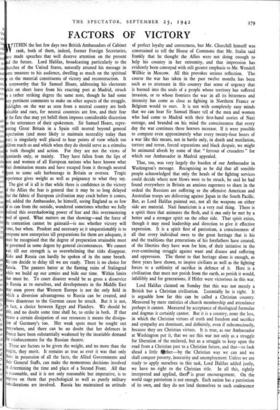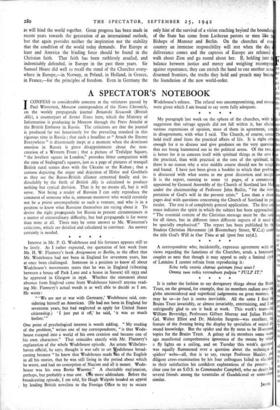FACTORS OF VICTORY
ITHIN the last few days two British Ambassadors of Cabinet rank, both of them, indeed, former Foreign Secretaries, Ix made speeches that well deserve attention on the present d the future. Lord Halifax, broadcasting particularly to the urches of the United States, naturally attuned his message in me measure to his audience, dwelling as much on the spiritual on the material constituents of victory and reconstruction. It noteworthy that Sir Samuel Hoare, addressing his electorate hik on short leave from his exacting post at Madrid, struck a rather striking degree the same note, though he had some cry pertinent comments to make on other aspects of the struggle. idelights on the war as seen from a neutral country are both aluable and rare, for neutral countries are few, and their fear f the fate that may yet befall them imposes considerable discretion n the utterances of their spokesmen. Sir Samuel Hoare, repre- nting Great Britain in a Spain still neutral beyond general xpectation (and more likely to maintain neutrality today than er) is singularly well placed to hear points of view which too ldom reach us and which when they do should serve as a stimulus both thought and action. For they are not the views of paniards only, or mainly. They have fallen from the lips of en and women of all European nations who have known what azi domination means and have escaped from it through neutral pain to some safe harbourage in Britain or oversea. Tragic .perience gives weight as well as poignancy to what they say. The gist of it all is that while there is confidence in the victory f the Allies the fear is general that it may be so long delayed at the fabric of European civilisation may crack before it comes, nd, added the Ambassador, he himself, seeing England as so few us can from the outside, wondered sometimes whether we fully ealised this overshadowing power of fear and this overmastering red of speed. What matters on that showing—and the force of e contention cannot be gainsaid—is noc whether victory will ome, but when. Prudent and necessary as, it unquestionably is to ostpone new enterprises till preparations for them are adequate, it ust be recognised that the degree of preparation attainable must governed in some degree by general circumstances. We cannot ait till our strength is so overwhelming that risks disappear. sks and Russia can hardly be spoken of in the same breath. e can decide to delay till we are ready. There is no choice for ussia. The panzers batter at the flaming ruins of Stalingrad lite we build up our armies and bide our time. Within limits t must be. To court disaster would be as gross a disservice o Russia as to ourselves, and developments in the Middle East ay soon prove that Western Europe is not the only field in hich a diversion advantageous to Russia can be created, and ows disastrous to the German cause be struck. But it is not, fact, a choice between Egypt and Flanders. We should be ble, and no doubt some time shall be, to strike in both. If that eans a certain dissipation of our resources it means the dissipa- on of Germany's too. Her weak spots must be sought out erywhere, and there can be no doubt that her defences in France have been substantially weakened by the insatiable demand for reinforcements for the Russian theatre.
These are factors to be given the weight, and no more than the weight, they merit. It remains as true as ever it was that only those in possession of all the facts, the Allied Governments and their General Staffs, can make the momentous decisions involved in determining the time and place of a Second Front. All that Is reasonable, and it is not only reasonable but imperative, is to impress on them that psychological as well as purely military Considerations are involved. Russia has maintained an attitude of perfect loyalty and correctness, but Mr. Churchill himself was constrained to tell the House of Commons that Mr. Stalin said frankly that he thought the Allies were not doing enough to help his country in her extremity, and that impression has evidently been conveyed with still greater emphasis to Mr. Wendell Willkie in Moscow. All this provokes serious reflection. The course the war has taken in the past twelve months has been such as to attenuate in this country that sense of urgency that is burned into the souls of a people whose territory has suffered invasion, or to whose frontiers the war in all its bitterness and intensity has come as close as fighting in Northern France or Belgium would to ours. It is not with completely easy minds that we can hear Sir Samuel Hoare tell of the men and women who had come to Madrid with their first-hand stories of Nazi outrage, and branded on his mind the consciousness that every day the war continues these horrors increase. If it were possible to compute even approximately what every twenty-four hours of a war like this means, not in battle only, in death and mutilation, torture and terror, forced separations and black despair, we might be animated afresh by some of that " fervour of crusaders " for which our Ambassador in Madrid appealed.
That, too, was very largely the burden of our Ambassador in Washington's message. Recognising as he did that all sensible people acknowledged that only the heads of the fighting services could decide where new blows were to be struck, he said he had found everywhere in Britain an anxious eagerness to share in the ordeal the Russians are suffering or the offensive American and Australian troops are delivering against Japan in the South Pacific. But, as Lord Halifax pointed out, not all the weapons on either side are material. Nazi fanaticism is a very real thing. There is a spirit there that animates the flesh, and it can only be met by a better and a stronger spirit on the other side. That spirit exists, though it may need leadership and direction to give it effective expression. It is a spirit first of patriotism, a consciousness of all that every individual owes to the great heritage that is his and the traditions that generations of his forefathers have created, of the liberties they have won for him, of their initiative in the ever-continuing struggle against want and disease and suffering and oppression. The threat to that heritage alone is enough, as these years have shown, to inspire civilians as well as the fighting forces to a sublimity of sacrifice in defence of it. Here is a civilisation that must not perish from the earth, as perish it would, infallibly and for generations, if Hitler were victorious in this war.
Lord Halifax claimed on Sunday that this was not merely a British but a Christian civilisation. Essentially he is right. It is arguable how far this can be called a Christian country. Measured by mere statistics of church membership and attendance perhaps it cannot. Measured by acceptance of theological formulae and dogmas it certainly cannot. But it is a country, none the less, in which the Christian virtues of truth and freedom and sacrifice and sympathy are dominant, and definitely, even if subconsciously, because they are Christian virtues. It is true, as our Ambassador at Washington put it, that we see this war not only as a struggle for liberation of the enslaved, but as a struggle to keep open the road from a Christian past to a Christian future, and that—to look ahead a little ether—by the Christian way we can and we shall conquer poverty, insecurity and unemployment. Unless we are ready to apply ourselves to this task, Lord Halifax added justly, we have no right to the Christian tide. In all this, rightly interpreted and applied, there is great encouragement. On the world stage patriotism is not enough. Each nation has a patriotism of its own, and they do not lend themselves to such coalescence as will bind the world together. Great progress has been made in recent years towards the generation of an international outlook, but that again provides neither the inspiration nor the stability that the condition of the world today demands. For Europe at least and America the binding force should be found in the Christian faith. That faith has been ruthlessly assailed, and indomitably defended, in Europe in the past three years. Sir Samuel Hoare did well to recall the stand of the Churches every- where in Europe,—in Norway, m Poland, in Holland, in Greece, in France,—for the principles of freedom. Even in Germany the only hint of the survival of a vision reaching beyond the boundari of the State has come from Lutheran pastors or men like Bishops of Munster and Berlin. On the churches of ev country an immense responsibility will rest when the day deliverance comes and the captives of Europe are released walk about Zion and go round about her. If, holding just balance between justice and mercy and weighing- recomp against repentance, they can stretch the hand to one another a disarmed frontiers, the truths they hold and preach may beco the foundation of the new world-order.



























 Previous page
Previous page